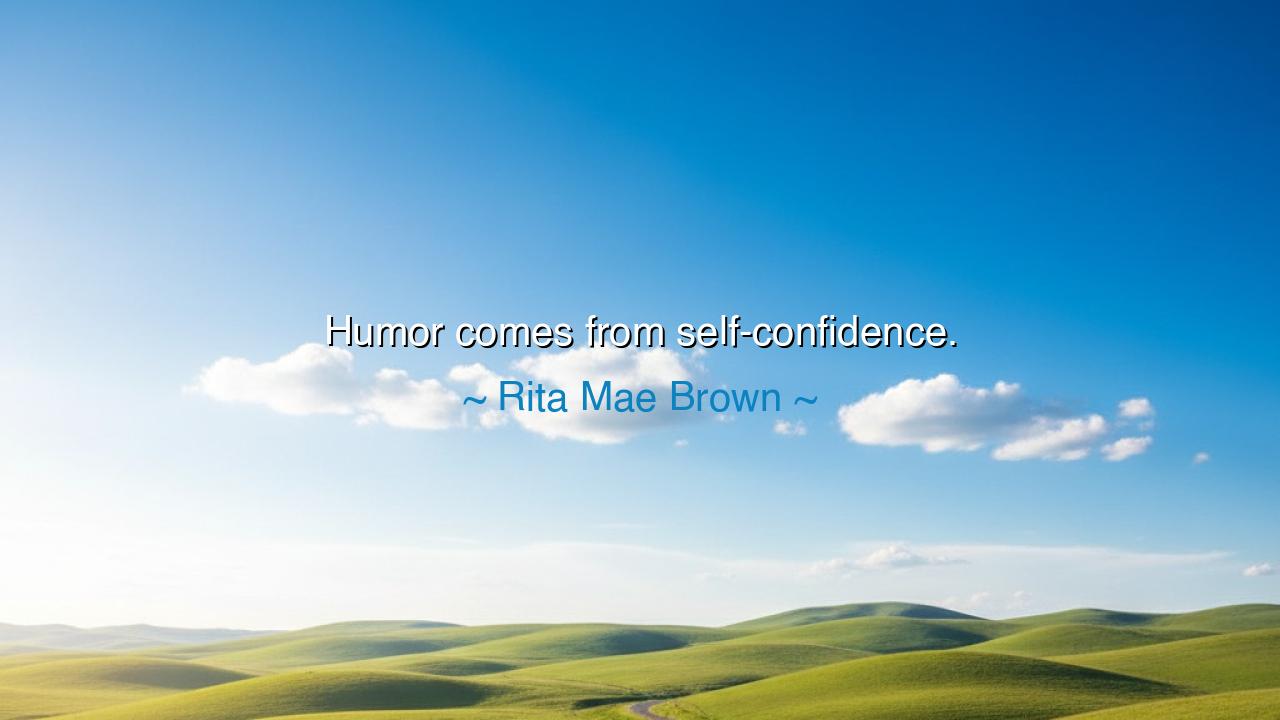
Humor comes from self-confidence.






When Rita Mae Brown said, “Humor comes from self-confidence,” she revealed a truth as old as humanity itself: that laughter is not merely a frivolous indulgence, but a reflection of inner strength. To wield humor effectively requires an awareness of one’s own value, an acceptance of one’s flaws, and the courage to stand undiminished before the world. Those who laugh lightly, who see life’s absurdities and respond with wit, possess a foundation of self-confidence that allows them to transform observation into insight without fear. Humor is, in essence, the visible echo of inner assurance.
The ancients understood this principle well. Aristotle, in his writings on rhetoric and ethics, emphasized that the individual who possesses virtue and self-knowledge is free from the anxieties that plague the insecure. True humor, he would argue, is a product of this freedom: it is not defensive, nor is it mean-spirited. It arises from mastery over oneself. Brown’s insight mirrors this ancient teaching: confidence is the soil from which laughter grows, strong, resilient, and liberating.
Consider the example of Winston Churchill, whose humor was legendary even amidst the direst circumstances of war. Churchill’s wit, often sharp and unflinching, reflected not vanity but deep self-assurance. He could mock adversity, political opponents, and even himself, because he was grounded in his own sense of purpose and capability. His humor inspired, rallied, and sustained, showing the world that laughter is inseparable from courage and confidence — that to jest is to assert mastery over circumstance.
Self-confidence allows one to laugh without fear of judgment. The insecure fear ridicule, misunderstanding, or exposure, and thus humor becomes forced or defensive. In contrast, those who possess self-assurance, as Brown observes, can wield humor freely, allowing it to illuminate truths and bridge human connection. It is a power that flows outward, fostering both empathy and engagement. The ancient Stoics would recognize this: mastery of self brings freedom of expression, and humor is one of its most joyful manifestations.
Historical figures in art and literature demonstrate this principle as well. Mark Twain, whose wit pierced social conventions, used humor as a weapon of insight. His confidence in his perspective allowed him to mock folly without cruelty, to reveal human weakness without self-deception. Twain’s writing shows that humor rooted in self-assurance is fearless: it embraces truth, challenges pretense, and teaches while it entertains. Without confidence, wit falters; with it, humor becomes transformative.
Rita Mae Brown’s words also illuminate the interplay between humility and humor. True confidence is not arrogance; it is a grounded awareness of both strengths and limitations. To laugh, particularly at oneself or at life’s absurdities, requires an acknowledgment of imperfection, a comfort with vulnerability. The ancient playwrights often depicted heroes who could endure misfortune with laughter, demonstrating that courage and self-assurance empower the soul to respond to life with both levity and dignity.
The lesson, then, is clear: cultivate self-confidence as the foundation of your humor. By understanding and accepting yourself, you gain the freedom to observe, to jest, and to connect without fear. Humor becomes a mirror of your inner strength, reflecting both resilience and grace. As Rita Mae Brown teaches, laughter is not mere entertainment — it is a signal of mastery over the self, a mark of assurance that allows the human spirit to shine even in adversity.
In practical terms, this means investing in self-awareness, embracing your strengths and weaknesses, and practicing reflection. Approach life with curiosity and courage, and allow humor to emerge naturally from your grounded perspective. Share your laughter generously, but always from a place of confidence, not defensiveness. By doing so, you transform humor into a tool of connection, resilience, and joy — demonstrating that true wit is born from the heart that knows its own value.






AAdministratorAdministrator
Welcome, honored guests. Please leave a comment, we will respond soon